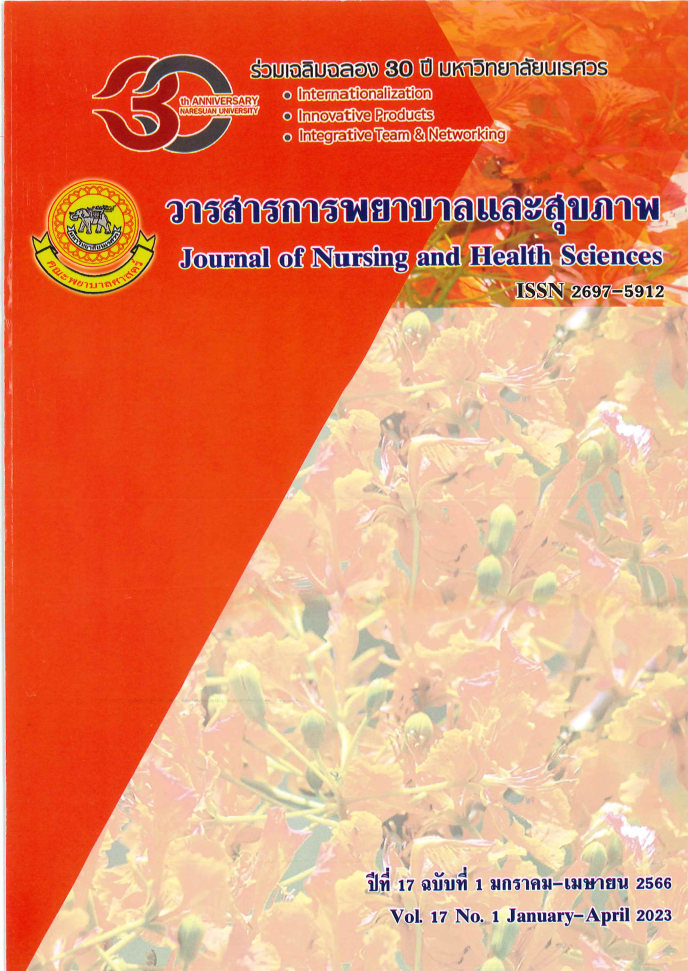ผลของการใช้รูปแบบการสอนภาคปฏิบัติร่วมกับกิจกรรมจิตตปัญญาศึกษาเพื่อส่งเสริมความเข้มแข็งทางใจของนักศึกษาพยาบาลในการฝึกปฏิบัติการพยาบาลครั้งแรก
Main Article Content
บทคัดย่อ
การวิจัยครั้งนี้เป็นการวิจัยกึ่งทดลองแบบหนึ่งกลุ่ม มีวัตถุประสงค์เพื่อศึกษาผลของการใช้รูปแบบการสอนภาคปฏิบัติร่วมกับกิจกรรมจิตตปัญญาศึกษา เพื่อส่งเสริมความเข้มแข็งทางใจของนักศึกษาพยาบาลในการฝึกปฏิบัติการพยาบาลครั้งแรก กลุ่มตัวอย่างเป็นนักศึกษาพยาบาลชั้นปีที่ 2 จำนวน 26 คนที่ฝึกปฏิบัติวิชาปฎิบัติหลักการและเทคนิคการพยาบาล 1 ณ หอผู้ป่วย กลุ่มตัวอย่างได้รับการสอนภาคปฏิบัติร่วมกับกิจกรรมจิตตปัญญาศึกษาตามแนวคิดจิตตปัญญาศึกษา ศูนย์จิตตปัญญาศึกษา มหาวิทยาลัยมหิดล และจูดิท ซิมเมอร์ บาวน์ (Judith Simmer-Brown) รวบรวมข้อมูลโดยแบบสอบถามความเข้มแข็งทางใจในการฝึกปฏิบัติการพยาบาล ซึ่งผู้วิจัยพัฒนาขึ้นเอง และมีค่าความเชื่อมั่นเท่ากับ .87 และแบบสอบถามความคิดเห็นเกี่ยวกับการใช้จิตตปัญญาศึกษาในการฝึกปฏิบัติการพยาบาลซึ่งเป็นคำถามปลายเปิด เก็บข้อมูลก่อนฝึกและหลังฝึกปฏิบัติครบ 3 สัปดาห์ วิเคราะห์ข้อมูลเชิงปริมาณ โดยสถิติเชิงพรรณนา สถิติทดสอบใช้วิลคอกซัน และข้อมูลคุณภาพใช้การวิเคราะห์เชิงเนื้อหา ผลการวิจัย พบว่า คะแนนความเข้มแข็งทางใจทั้ง 3 องค์ประกอบ คือ 1) ฉันเป็นคนที่มีความเข้มแข็ง ภายใน (I Am) 2) ฉันมีความสามารถ (I Can) และ 3) ฉันมีแหล่งสนับสนุน (I Have) ภายหลังได้รับการ สอนด้วยรูปแบบการสอนภาคปฏิบัติร่วมกับกิจกรรมจิตตปัญญาศึกษา มีคะแนน ฯ สูงกว่าก่อนการได้รับการสอนอย่างมีนัยสำคัญทางสถิติที่ระดับ .01 ความคิดเห็นของนักศึกษาหลังได้รับรูปแบบการสอนฯ พบว่า นักศึกษาได้พูดระบาย ความเครียด ความวิตกกังวล มีการฝึกสติ และรับฟังเพื่อน ใช้ธรรมชาติในการสะท้อนความรู้สึกหรือความจริงในชีวิต ทำให้นักศึกษาสามารถปรับตัวเชิงบวกและเรียนรู้ที่จะดูแลผู้ป่วยได้ดีขึ้น เพราะได้รับการช่วยเหลือสนับสนุนทั้งด้านจิตใจและด้านการฝึกปฏิบัติทักษะจากเพื่อน ครูและพยาบาลในหอผู้ป่วย ดังนั้นจึงกล่าวได้ว่าการใช้รูปแบบการสอนภาคปฏิบัติร่วมกับกิจกรรมจิตตปัญญาศึกษาช่วยส่งเสริมความเข้มแข็งทางใจของนักศึกษาพยาบาลในการฝึกปฏิบัติการพยาบาลครั้งแรก ส่งผลทำให้นักศึกษาได้มีโอกาสเข้าใจและทบทวนตนเอง เกิดการเรียนรู้ทั้งภายในตนเองและทักษะการปฏิบัติทางการพยาบาลพื้นฐานมากขึ้น
Article Details

อนุญาตภายใต้เงื่อนไข Creative Commons Attribution-NonCommercial-NoDerivatives 4.0 International License.
เอกสารอ้างอิง
Abukari, Z. (2018). Not giving up” Ghanaian students perspectives on resilience, risk, and academic achievement.PLOS ONE, 1-13.
Academic Department, Boromarajonani College of Nursing, Buddhachinaraj. (2021). Data on counseling for nursing students, Student Affairs Section, Boromarajonani College of Nursing, Buddhachinaraj. (Copied document). [In Thai].
Amsrud, K. E., Lyberg, A., & Severinsson, E. (2019). Development of resilience in nursing students: A systematic qualitative review and thematic synthesis. Nurse education in practice, 41, 102621. Retrieved 20 February 2023 from https://doi.org/10.1016/j.nepr.2019.102621
Best, W. J. (1978). Research in education (3rd ed.). New Jersey: Prentice Hall.
Bundasak, T., Nabkasorn, C., & Vatanasin, V. (2017). The effects of the resilience enhancement program on happy learning among nursing students. Master Thesis (Mental Health and Psychiatric Nursing), Burapha University, Chon Buri. [In Thai]
Bundasak, T., Junasema, N., Supsung, A., & Chaichanarungruang, W. (2021). Prevention of depression among nursing students. Boromarajonani College of Nursing, Uttaradit Journal, 13(1) 62-70. [In Thai].
Contemplative Education Center, Mahidol University. (2014). Contemplative education. Retrieved 12 March 2023 from http://www.ce.mahidol.ac.th/eng/. [In Thai].
Chaiwcharn,T., & Papol, A. (2020). The stress of nursing student training. EAU Heritage Journal Science and Technology,15(1), 21-28. [In Thai].
Chaiwong, N., & Maneepun, N. (2020). The effects of the resilience enhancement program on adjustment of the first year nursing student in faculty of nursing at Buriram Rajabhat university. Udonthani Hospital Medical Journal, 28(3), 315-325. [In Thai].
Chiddee, K., Siriphan, S., Tawetanawanich, Y., Srathong, P., & Hayee, F. (2020). Learning process through ontemplative education: Writing reflections in a journal. The Southern College Network Journal of Nursing and Public Health, 7(3), 23-38. [In Thai].
Chow, K.M., Tang, W.K.F., Chan, W.H.C., Sit, W.H.J., Choi, K.C., & Chan, S. (2018). Resilience and well-being student in Hong Kong: A cross-sectional study. BMC Medical Education, 18(13), 1-8.
Froneman, K., Plessis, E., & Koen, M.P.(2016). Effective educator–student relationships in nursing education to strengthen nursing students’ resilience. Curationis, 29(1), 1-9. Retrieved 12 February 2023 from http://www.curationis.org.za
Fullerton, D.J., Zhang, L.M., & Kleitman, S. (2021). An integrative process model of resilience in an academic context: Resilience resources, coping strategies, and positive adaptation. PLoS ONE, 16(1), 1-22.
Ghod, A., Ebadi, A., Nia, H.S., Allen, K., & Ali-Abadi, T. (2022). Academic burnout in nursing students: An explanatory sequential design. Nursing open, 10,535-543. Retrieved 12 February 2023 from wileyonlinelibrary.com/journal/nop2
Grotberg, E. (1995). A guide to promoting resilience in children. Retrieved 10 February 2022 from https://bibalex.org/baifa/attachment/documents/115519.pdf
Jamjeng, S., Austhamethakul, W., & Pituksin, D. (2018). The effect of readiness preparation for nursing practice in ward of 2nd year nursing students, Borommarajonnani College of Nursing, Ratchaburi. Journal of Science and Technology, Ubon Ratchathani University, 20(3), 147-163. [In Thai].
Kamdaeng, P. (2021). Supervision in clinical practice regarding expectations of nursing students. Journal of Nurses Association of Thailand Northern Region, 27(1), 17-28. [In Thai].
Lanz, J.J. (2020). Evidence-based resilience intervention for nursing students: A randomized controlled pilot trial. International Journal of Applied Positive Psychology, 5, 217–230.
Liljestrand, R. (2022). Building resilience in undergraduate nursing students: Evaluation of changing minds, changing crisis. Doctor of Nursing Practice (DNP) Project. University of Massachusetts Amherest.
Morrison, R., & Pidgeon, A.M. (2017). Cultivating resilience and self-control among University students: An experimental study. Universal Journal of Psychology, 5(1), 1-7.
Omir, A. (2014). Sample size estimation and sampling techniques for selecting a representative sample. Journal of Health Specialties, 2(4), 142-146.
Sanitlou, N., Sartphet, W., & Napha-arrak, Y. (2019). Sample size calculation using G* power program. Academic Journal of Suvarnabhumi institute of technology, 5(1), 496-507.
Sangsanguan, W. (2019). The effectiveness of resilience enhancement program by using Problem - based Learning in undergraduate nursing students. Journal of The Royal Thai Army Nurses, 20(2), 186-194. [In Thai].
Simmer-Brown, J. (2019). Contemplative teaching and learning: Opportunities for Asian studies. ASIANetwork Exchange, 26(1), 5-25.
Sornlob, P., Sroisong, S., Fuongtong, P., & Teerapong, N. (2022). Effects of contemplative education on happiness learning and holistic nursing among nursing students. Journal of Health Science Boromarajonani College of Nursing Sunpasitthiprasong, 6(1), 112-126. [In Thai].
Sonlob, P., Prompuk, B., & Teerapong, N. (2020). Effects of contemplative education program on self awareness and happiness in learning of nursing students. Journal of Nurses Association of Thailand Northern Region,26(1) 41- 53. [In Thai].
Sripho, S., & Chanchuwan, S. (2022). The effect of the resilience enhancement program on stress among the first year nursing students of nursing college under the Ministry of Public Health. The Journal of Boromarajonani College of Nursing, Suphunburi, 5(1), 32-48. [In Thai].
Stubin, C. (2020). Clinical stress among undergraduate nursing student: Perceptions of clinical nursing faculty. The International Journal of Nursing Education Scholarship, 17(1), 1-10.
Veigh, C.M., Reid, J., Carswell, C., Ace, L., Walsh, I., Graham-Wisener, L., Rej, S., Potes, A., Atkinson, K., Edginton, T., & Nobe, H. (2021). Mindfulness as a well-being initiative for future nurses: A survey with undergraduate nursing students. BMC Nursing, 20(253), 1-9.
Walsh, P., Owen, P., Mustafas, N., & Beech. (2020). Learning and teaching approaches promoting resilience in student nurses: An integrated review of the literature. Retrieved 12 February 2023 from https://pubmed..ncbi.nlm.nih.gov/32302957
Zajonc, A. (2013). Contemplative pedagogy: A quiet revolution in higher education. New Directions for Teaching & Learning, 134,(Special issue) 83-94. Retrieved 12 February 2023 from https://doi.org/10.1002/tl.20057


